| Srl | Item |
| 1 |
ID:
024505


|
|
|
|
|
| Publication |
London, Macmillan Press Ltd., 1972.
|
| Description |
xxiv, 138p.
|
|
|
|
|
|
|
|
|
|
|
|
Copies: C:1/I:0,R:0,Q:0
Circulation
| Accession# | Call# | Current Location | Status | Policy | Location |
| 011276 | 332.152/CHA 011276 | Main | On Shelf | General | |
|
|
|
|
| 2 |
ID:
151262
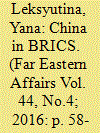

|
|
|
|
|
| Summary/Abstract |
The author cites arguments in support of the thesis that China, while standing out among the BRICS countries in its economic achievements and a high degree of involvement in world economic ties, is the main beneficiary of the BRICS efforts aimed at changing the present monetary and financial system.
|
|
|
|
|
|
|
|
|
|
|
|
|
|
|
|
| 3 |
ID:
090969
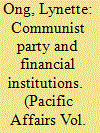

|
|
|
|
|
| Publication |
2009.
|
| Summary/Abstract |
Although the rural credit cooperatives are the only formal credit providers to millions of households in rural China, empirical evidence suggests that they do not serve the interests of member households very effectively. This study examines how far the recent institutional reforms have addressed the problems of insider control and collective action in corporate governance and reduced local political influence on their operations.
It contributes to the currently scant literature on the reasons for the persistence in China of local political interference in loan allocations. This study's findings suggest the need for a re-evaluation of the conventional wisdom that the role of local states in China's development is a positive one.
|
|
|
|
|
|
|
|
|
|
|
|
|
|
|
|
| 4 |
ID:
066826
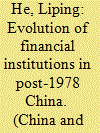

|
|
|
| 5 |
ID:
070225


|
|
|
| 6 |
ID:
075416


|
|
|
| 7 |
ID:
124215


|
|
|
|
|
| Publication |
2013.
|
| Summary/Abstract |
Over the past 10 years Northern aid agencies have made a concerted effort to participate in South-South cooperation. This article analyses the key modes and motivations behind this growing engagement, looking specifically at three areas: multilateral platforms, triangular cooperation and knowledge production about South-South cooperation. Across all these efforts we perceive a concerted attempt to gain legitimacy by emphasising horizontality in the co-construction of knowledge about development. We argue that, within a context of shrinking Northern aid, this engagement is a way to harness South-South cooperation in order to preserve and expand Northern influence, both within and outside the field of development cooperation. This interpretation suggests the need to further examine the 'bridging' initiatives and mutual impact of intersection points between Northern aid and South-South cooperation.
|
|
|
|
|
|
|
|
|
|
|
|
|
|
|
|
| 8 |
ID:
111955


|
|
|
|
|
| Publication |
2012.
|
| Summary/Abstract |
I investigate one mechanism through which financial institutions could have used political influence to receive preferential treatment in the US Department of the Treasury-administered "bailout." I find that neither proxies of political influence nor other political variables, such as public interest in specific deals, can explain variance in the sale price of warrants (a type of financial asset) Treasury acquired through TARP's Capital Purchase Program. Moreover, I find that the more politically active the firm is, the more likely Treasury is to auction its warrants (thereby receiving fair market value). This conclusion is not consistent with recent studies investigating the role of such variables in the initial administration of TARP and can be interpreted as good news for American taxpayers.
|
|
|
|
|
|
|
|
|
|
|
|
|
|
|
|
| 9 |
ID:
073990


|
|
|
|
|
| Publication |
2006.
|
| Summary/Abstract |
This article confronts the problem of private authorities engaging in rule-making activities for public purposes. This form of rule-making raises questions about the justice, authority and, most importantly, legitimacy of these institutional arrangements. The private authority that creates rules in the international financial system relies on claims of efficiency and expertise. These claims focus on the rules created rather than the institutions that create them, institutions that are private and thus self-interested in a different way from public authorities. The article explores these issues through a review of the role of banks that engage in rule-making at the global level.
|
|
|
|
|
|
|
|
|
|
|
|
|
|
|
|
| 10 |
ID:
101214


|
|
|
| 11 |
ID:
118027
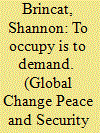

|
|
|
|
|
| Publication |
2013.
|
| Summary/Abstract |
The question of making demands has become somewhat fetishized in the Occupy Movement, the one thing endlessly debated in each local occupation and in nearly all journalistic or academic commentaries on the phenomena. This is not without good reason. For to 'demand' presupposes at least two things: that there is a coherent object of need or desire to be obtained, and that there is some person, body or institution that can grant it. Neither presupposition however, holds in the context of Occupy, whose aims, make-up and decision-making processes change from city to city, and from person to person involved within it. While opposition to income in equality and control of financial institutions over public life are common themes, as is direct action and dialogic internal forms of consensus-building, these do not permit a definitive set of oppositional demands, at least in the traditional political sense. Occupy, then, is a hitherto unknown form of political expression.
|
|
|
|
|
|
|
|
|
|
|
|
|
|
|
|
| 12 |
ID:
143419
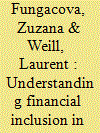

|
|
|
|
|
| Summary/Abstract |
We use data from the World Bank Global Findex database for 2011 to analyze financial inclusion in China, including comparisons with the other BRICS countries. We find a high level of financial inclusion in China manifested by greater use of formal account and formal savings than in the other BRICS. Financial exclusion, i.e., not having a formal account, is mainly voluntary. The use of formal credit is however less frequent in China than in the other BRICS. Borrowing through family or friends is the most common way of obtaining credit in all the BRICS countries, but other channels for borrowing are not very commonly used by individuals in China. We find that higher income, better education, being a man, and being older are associated with greater use of formal accounts and formal credit in China. Income and education influence the use of alternative sources of borrowing. Overall financial inclusion does not constitute a major problem in China, but such limited use of formal credit can create a challenge for further economic development.
|
|
|
|
|
|
|
|
|
|
|
|
|
|
|
|